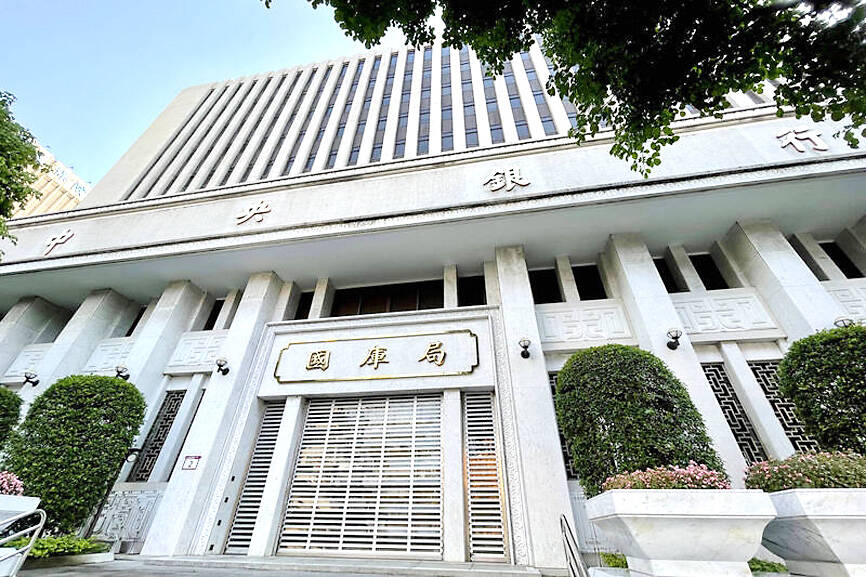The nation’s balance of payments last quarter registered a current account surplus of US$27.22 billion, widening from US$22.24 billion three months earlier, as imports fell faster than exports, although both declined, the central bank said yesterday.
The current account surplus grew US$5.17 billion during the June-to-September period, when trade surpluses reached a new high of US$30.11 billion, central bank research official Tsao Ti-jen (曹體仁) told an online news conference.
The showings had little to do with strong exports, which remained in negative territory, as did imports, Tsao said.

Photo: George Tsorng, Taipei Times
Rather, imports tumbled faster than exports amid sharp price corrections in oil and raw material prices, giving Taiwan trade surpluses. Poor imports also had to do with local firms’ conservative approach to inventory management, he said.
At the same time, the services account booked a deficit of US$4.4 billion, accelerating from US$3.29 billion a year earlier, as demand for local cargo shipping services shrank further, while outbound travel expenditures inflated, Tsao said.
Travel expenditures amounted to US$5.13 billion, while travel income stood at US$2.46 billion, driving travel deficits to a peak of US$2.67 billion, he said.
Outbound tourist visits appeared to have reclaimed pre-COVID-19 pandemic levels, but foreign tourist arrivals left room for improvement, Tsao said, adding that the gap would taper off as the world emerges further from COVID-19 disruptions.
Taiwanese hotels have said that visitors from Japan have evidently disappointed thus far, due mainly to a weak Japanese yen.
Foreign investment cooled to US$180 million, its lowest level since the first quarter of 2019, as global investors practiced caution amid lingering restrictive interest rates and economic uncertainty, Tsao said.
Outbound investment posted another record of US$6.09 billion, as local financial institutes and retail investors raised stakes in US bonds and other US dollar-based investment tools that generate higher yields, he said.

Semiconductor business between Taiwan and the US is a “win-win” model for both sides given the high level of complementarity, the government said yesterday responding to tariff threats from US President Donald Trump. Home to the world’s largest contract chipmaker, Taiwan Semiconductor Manufacturing Co (TSMC, 台積電), Taiwan is a key link in the global technology supply chain for companies such as Apple Inc and Nvidia Corp. Trump said on Monday he plans to impose tariffs on imported chips, pharmaceuticals and steel in an effort to get the producers to make them in the US. “Taiwan and the US semiconductor and other technology industries

SMALL AND EFFICIENT: The Chinese AI app’s initial success has spurred worries in the US that its tech giants’ massive AI spending needs re-evaluation, a market strategist said Chinese artificial intelligence (AI) start-up DeepSeek’s (深度求索) eponymous AI assistant rocketed to the top of Apple Inc’s iPhone download charts, stirring doubts in Silicon Valley about the strength of the US’ technological dominance. The app’s underlying AI model is widely seen as competitive with OpenAI and Meta Platforms Inc’s latest. Its claim that it cost much less to train and develop triggered share moves across Asia’s supply chain. Chinese tech firms linked to DeepSeek, such as Iflytek Co (科大訊飛), surged yesterday, while chipmaking tool makers like Advantest Corp slumped on the potential threat to demand for Nvidia Corp’s AI accelerators. US stock

The US Federal Reserve is expected to announce a pause in rate cuts on Wednesday, as policymakers look to continue tackling inflation under close and vocal scrutiny from US President Donald Trump. The Fed cut its key lending rate by a full percentage point in the final four months of last year and indicated it would move more cautiously going forward amid an uptick in inflation away from its long-term target of 2 percent. “I think they will do nothing, and I think they should do nothing,” Federal Reserve Bank of St Louis former president Jim Bullard said. “I think the

SUBSIDIES: The nominee for commerce secretary indicated the Trump administration wants to put its stamp on the plan, but not unravel it entirely US President Donald Trump’s pick to lead the agency in charge of a US$52 billion semiconductor subsidy program declined to give it unqualified support, raising questions about the disbursement of funds to companies like Intel Corp and Taiwan Semiconductor Manufacturing Co (台積電). “I can’t say that I can honor something I haven’t read,” Howard Lutnick, Trump’s nominee for commerce secretary, said of the binding CHIPS and Science Act awards in a confirmation hearing on Wednesday. “To the extent monies have been disbursed, I would commit to rigorously enforcing documents that have been signed by those companies to make sure we get